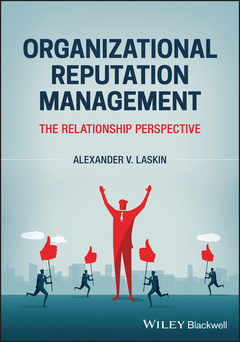Organizational Reputation Management A Strategic Public Relations Perspective
Auteur : Laskin Alexander V.

The first textbook to teach organizational reputation through managing relationships with key organizational publics, perfect for business and management students
Organizational Reputation Management provides a thorough overview of the function of public relations as a strategic activity of building and maintaining the reputations of corporations, governments, and non-profit organizations. Offering a real-world relationship management perspective, Alexander V. Laskin defines organizational reputation through relationships with key organizational stakeholders such as investors, employees, and customers. The text enables future organizational leaders to develop an appreciation of the importance of reputation and a solid understanding of the process of reputation management.
Organizational Reputation Management introduces students to all major concepts of reputation management while employing a unique approach to defining and analyzing reputation. With an engaging and readable style, student-friendly chapters illustrate key public relations concepts?including the Research, Planning, Implementation, and Evaluation (RPIE) process, the Paid, Earned, Shared, and Owned (PESO) communications model, and the Barcelona Principles?and apply them in the context of organizational reputation.
- Covers the many factors that impact organizational reputation
- Discusses the reputations of organizations as public-dependent constructs
- Presents a process of reputation management (F.O.C.U.S.) based on the RPIE method
- Considers the latest updates of the Barcelona Principles for communication measurement
- Includes a dedicated chapter on reputation measurement and evaluation
Designed to be used with the PRSA MBA/Business School Initiative curriculum, Organizational Reputation Management: A Strategic Public Relations Perspective is ideal for undergraduate and graduate courses in reputation management, public relations management, and strategic communication.
1. Organizational Reputation: Defining the Indefinable
2. Publics and Relationships: The True Job of Public Relations
3. Managing Reputation: The Never-Ending Process in F.O.C.U.S.
4. Measuring Reputation: You Cannot Manage What You Cannot Measure
5. Maintaining Reputation Through Crises and Around the World: Legal, Ethical, Professional, and Socially Responsible Perspectives
6. Employees and Other Internal Publics: Close to Heart
a. Case 6: Activision Blizzard: Can Microsoft Weather the Blizzard?
7. Investors and Shareholders: Money Talks
a. Case 7: WeWork: Will It Work After All?
8. Customers and Subscribers: More Than Making a Sale
a. Case 8: Victoria’s Secret: Is the Secret Out?
9. Government and Regulators: Playing by the Rules
a. Case 9: Tesla: Can Tesla Follow the (Yellow Brick) Road?
10. Media and Influencers: Any Publicity is Good Publicity
a. Case 10: Peloton: How Bumpy is the Trail Ahead?
Alexander V. Laskin, PhD, Professor of Strategic Communication, Quinnipiac University, Hamden, Connecticut, USA. He is the author of approximately 100 publications, focused primarily on investor relations, reputation management, and emerging technologies. His recent books include Investor Relations and Financial Communication and Social, Mobile, and Emerging Media Around the World. Laskin's research has been recognized with awards from the Association for Business Communication, the Association for Education in Journalism and Mass Communication, and the Institute for Public Relations. He has served as a Fulbright Specialist, Albert Schweitzer Fellow, and Plank Center Fellow.
Date de parution : 04-2024



